Definition of knowledge economy
The sector of the economy which is increasingly based on knowledge-intensive activities, creating a greater reliance on intellectual capital rather than physical inputs.
The OECD state the knowledge economy is associated with:
- High-tech manufacturing (computer, electronics, aerospace),
- Service sector industries, such as education healthcare and software design
- Business services such as insurance, information and communications.
In traditional models of economic activity, the main factors of production are Land, labour, capital, entrepreneur. A Knowledge-based economy is important for widening the scope of labour from producing goods on an assembly line to greater flexibility in design, manufacture and implementation of business ideas.
Types of knowledge
- Explicit knowledge – facts figures, data.
- Tacit knowledge – how things work, experience, judgement, intuition, the way of dealing with people.
Education qualifications are indications of a person’s explicit knowledge and, to some extent, tacit knowledge. But, a large part of the knowledge economy comes from learning by doing and falls outside the scope of traditional education.
Growth of knowledge economy
Innovation and knowledge have always been important to the economy, but some economists argue that in the past few decades the modern economy is becoming more knowledge-based. This is shown by the rise in high-tech industries, the growth of the service sector, rise in self-employment and an increase in the number of patents.
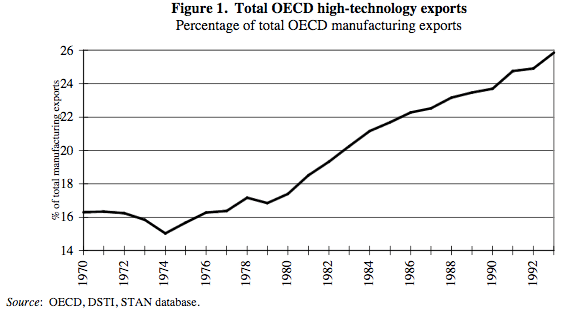
Rise in patents
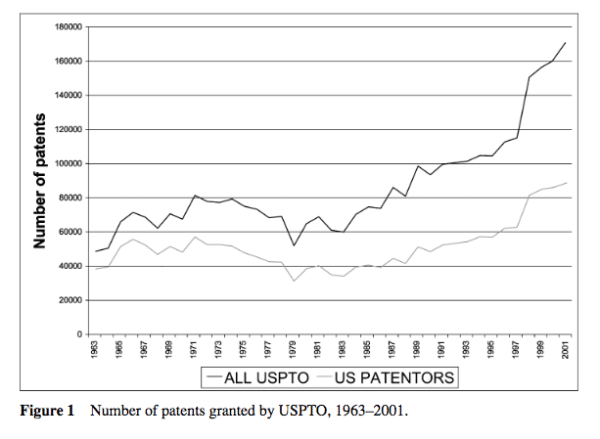
Rise in jobs in IT industry
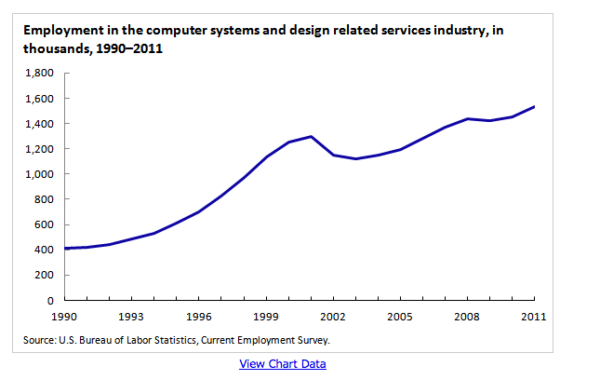
Characteristics of a knowledge economy
- Knowledge and information key driver of productivity.
- Growth in high technology investment and industries.
- Growth in knowledge intensive service sectors such as education, communications and information.
- Knowledge is a non-finite resource. Capital gets used up but knowledge is not limited and can be shared without losing it. In fact, sharing can help boost overall knowledge.
- Growth in demand for higher skilled labour / University degrees.
- Increased importance of tacit knowledge – the skills and ability to implement codified knowledge.
- Innovation is driven by both producers and users (for example, open source platforms/ customer feedback) rather than top-down linear systems.
- Knowledge spillovers from one industry to another.
- Nature of knowledge economy, related to the process of globalisation and global diffusion of knowledge.
- Knowledge economy and high-tech industry raise scope for increased automation of production processes leading to rapid changes in the labour market.
Importance of a knowledge economy
Can help business be more efficient, dynamic and innovative.
- Enables product innovation and customisation.
- Greater role for human capital. Firms need to attract and retain workers adapted to the new mode of economy.
- To enhance knowledge distribution and benefit from new working practices collaborative networks can help.
- New growth theories emphasise the potential for human capital and increasing knowledge to provide new sources of economic growth and high levels of productivity.
- Potentially greater demand for skilled labour. In OECD report unemployment for lower-secondary education is 10.5% – but just 3.8% for those with university education. [https://www.oecd.org/sti/sci-tech/1913021.pdf p. 10]
Problems of knowledge economy
The knowledge economy may have increased gap between high skilled and low-skilled workers due to decline in well-paid manual labour. There may be other factors behind increased wage inequality but the knowledge economy is one potential reason.
The knowledge economy may also be a factor behind the rise of the ‘Gig economy.‘ This creates more opportunities for those with high intellectual capacity, but those with lower skills may find work increasingly temporary and low-paid.
Limitations of knowledge economy
A limited number of high-skilled jobs. Despite the rise of high-tech industries, many jobs don’t require the highest levels of qualifications. Despite the rise of high-tech industries, many jobs don’t require the highest levels of qualifications.
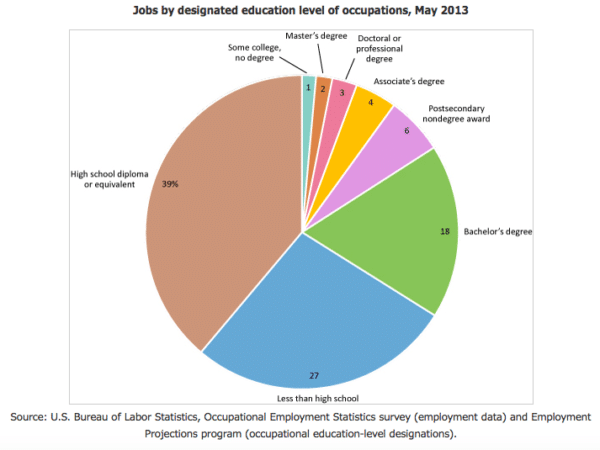
In the US in 2013, 66% of jobs did not require a university degree. BLS
With 40-50% of young people studying for degrees, there will be a disappointment as only a limited number of jobs which actually require high levels of qualifications. According to this article:
For every job as a skilled computer programmer, there are three jobs flipping burgers.
(Spicer, Andre. “The knowledge economy is a myth. We don’t need more universities to feed it.” Guardian 18 May 2016
Low productivity growth in past decade. Despite supposed benefits of the knowledge economy, recent decades have seen a slow down in rates of productivity and economic growth, suggesting we are experiencing a period of secular stagnation.
Conclusion
The knowledge economy is increasingly important. For workers, it presents both opportunities and threats. For those with both qualifications and tacit knowledge, there is greater scope for finding rewarding and high-paid work – quite possibly in self-employment. For those with low levels of qualifications and limited knowledge, the labour market may become increasingly challenging with a limited choice of low-paid work.
For firms, there is a challenge of developing and retaining human capital in a way that enables growth of business. It also means traditional models of firms are increasingly less relevant as firms have to be more dynamic in responding to changing nature of economic progress.
Related
- Human capital – definition and importance

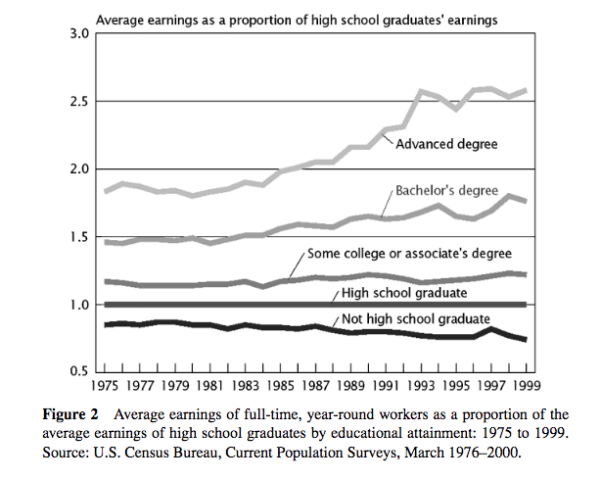
thank you …
i really appreciate your effort …
Thanks a lot mate for providing this information , it really helped me a lot : )
thanx …..i preciate your work
oooh…. great , you’ve simplified and expounded on the nature and scope of knowledge economy, its exciting.
Dude make it more easier for weak student like us
Knowledge Economy, very systematic collection of data and presentation, great effort…
Thank you for a clear writing on such profound topic. Please advise further new body of work on knowledge economy.
very simplified for anyone to understand
Detailed and informative article